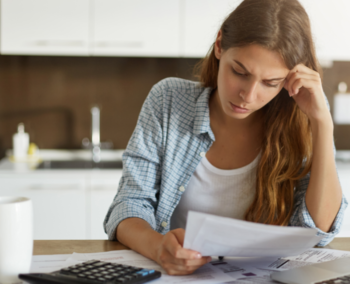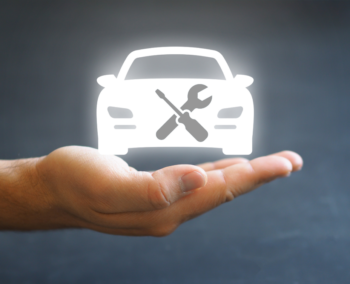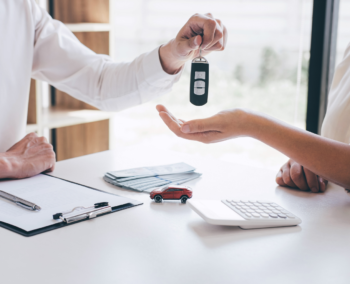Your credit report exists to give lenders an insight into your repayment habits, so they know what sort of risk you pose when lending you money.
It’s compiled from your credit accounts and shows whether you’ve made payments on time, the credit limits on your accounts, and how many applications you’ve made for credit recently.
So if you have a debt, it should be listed on your credit report, right?

Actually, not always. While your credit report is a fairly comprehensive look at your credit history to date, it’s not always all-encompassing.
So it’s very possible to owe a debt that isn’t listed on your credit report.
What debts show up on your credit report?
Generally speaking, your credit report will show the details of your borrowing over the past six years.
This includes credit cards, store cards, mortgages, overdrafts, personal loans and other accounts on which you make repayments, such as utilities, mobile phone and insurance.
However, here’s where it gets a little more complicated.
Firstly, there are three main credit reference agencies in the UK (Experian, Equifax and TransUnion) and not all lenders will report to them all.
While the major lenders often use all three, smaller companies may only use one or two. Then there are lenders who aren’t obliged to report information at all – such as insurers – so they might not use any of them.
This means on one credit report you might see all your debts and on another, you’ll only see a couple or even none.
Secondly, credit reports don’t show your full credit history – they only go six years back (although some negative marks such as bankruptcy can stay on your report for longer).

This is because your report is for lenders to base their decisions on what kind of borrower you are currently.
So, if you’re paying a debt back, such as a credit card, it’ll stay on your report until you’ve fully repaid it to a zero balance. Then, six years from the date you repaid the full balance, it’ll be removed from your report.
This isn’t true for defaulted debts, though. If you have an account that has defaulted, it’ll be removed from your credit history after six years – regardless of whether you’ve paid it off or not.
What debts do you have to pay that aren’t on your credit report?
In a nutshell, if you have unpaid debt, regardless of whether it appears on your credit report or not, you’re responsible for that debt and obliged to pay it back.
Let’s use the example of a defaulted account again.
If you’ve defaulted on a debt, you’ll either have come to an arrangement with the lender to repay the debt or alternatively it’ll have gone to a debt collection agency for you to repay it.
Six years after the account is marked as defaulted on your credit report, it’ll be removed. That doesn’t mean the debt has been fully repaid, though. And if it hasn’t, you’re still liable for it.
Other examples include HMRC or council tax arrears. These are types of debt that don’t show up on your credit report.
However, just because they aren’t on your report, doesn’t mean you shouldn’t pay them. In fact, by not paying them, you can find yourself in even more financial trouble perhaps leading to a CCJ – something that does stay on your report for a while.
How can I check if I owe a debt?
The first thing you should check to see if you owe a debt is always your credit report. As there are three separate credit agencies, it’s a good idea to check with all of them to get the most well-rounded view of your financial situation.
Other ways to check include going straight to the creditor, who’ll be able to give you all the information regarding your debt.
Check your bank statements and any correspondence you may have that could give you an idea as to where the debt has come from.

If you’ve moved home, you may want to check with the occupants of your previous address in case you’ve missed any letters.
If you suspect you have a County Court Judgement against you, the Registry Trust can give you full details.
While if you think you may be in arrears with council tax or child support payments, you would have to go directly to the agency in question to find out.
What if you can’t afford to pay the debts?
There’s never a situation in which it’s good to ignore your debts. If you’re not convinced that you owe the debt, you need to speak to the company involved directly and ask them to supply proof that you do.
If it’s the case that you can’t afford to pay the debt, you should face the problem head-on.
Speak to your creditors to see if you can come to an affordable arrangement to pay back what you owe.

Often they’ll run through an affordability check with you, so make sure you have all the details of your income and outgoings with you before you call.
If you’re struggling to pay back debt or have money worries, it’s important to seek help.
Charities such as StepChange provide free advice, as well as debt management solutions and will even talk to your creditors for you.
Will debts that aren’t listed on my credit report affect my application for car finance?
Your credit report is only one source of information that a lender uses. Each lender will have its own eligibility criteria that you’ll need to meet as well.
When applying for car finance, a responsible lender will also look at affordability. If your income isn’t covering your outgoings, taking on more credit won’t help your situation. So it’s important to be honest about how much you can afford.
Lenders can also look at their own records, too. So, an application to a lender who may be part of the same financial group as another lender you’ve got an unlisted debt with means your application could be affected.
So before applying for car finance, it’s sensible to get a full idea of your current finances and ensure you have affordable arrangements for paying back any existing debt.
How to find out if you’ll be approved for car finance without affecting your credit score
If you’re worried about your credit score affecting your car finance application, there’s a quick and easy way to see if you’ll be approved.
Simply click Apply Now below, fill out our short online form, and within minutes we’ll let you know whether you’ll be accepted for car finance.
Rates from 12.9% APR. Representative APR 18.9% We are a credit broker, not a lender.
*a hard search will be performed if you decide to proceed


















